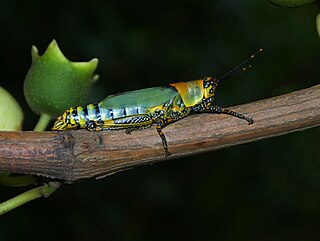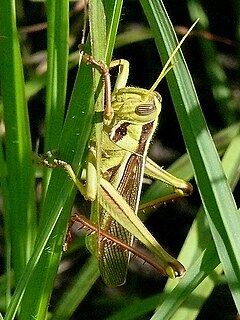
Orthoptera is an order of insects that comprises the grasshoppers, locusts and crickets, including closely related insects such as the katydids and wētā. The order is subdivided into two suborders: Caelifera – grasshoppers, locusts and close relatives; and Ensifera – crickets and close relatives.

Bandwings, or band-winged grasshoppers are the subfamily Oedipodinae of grasshoppers classified under the family Acrididae. They have a worldwide distribution and were originally elevated to full family status as the Oedipodidae. Many species primarily inhabit xeric weedy fields, and some are considered to be important locusts:

The Caelifera are a suborder of orthopteran insects. They include the grasshoppers and grasshopper-like insects, as well as other superfamilies classified with them: the ground-hoppers (Tetrigoidea) and pygmy mole crickets (Tridactyloidea). The latter should not be confused with the mole crickets (Gryllotalpidae), which belong to the other Orthopteran sub-order Ensifera.

Schistocerca is a genus of grasshoppers, commonly called bird grasshoppers, many of which swarm as locusts. The best known species is probably the desert locust and trans-Atlantic flight may explain the biogeography of some locust species.

The African rice grasshopper, Hieroglyphus daganensis is a medium-sized grasshopper species found in the Sahel region. Although not called a locust in English, this species shows gregarious behaviour and some morphological change on crowding and may become a moderately important pest species for small-holder farmers in the region.

Phymateus aegrotus, sometimes called the blue bush locust or East African bush locust, is a pest species of grasshopper in the family Pyrgomorphidae. Unlike "locusts" the adults are not known to change their morphology on crowding, but at the hopper stage, marching behaviour of small bands may occur.

Anacridium moestum, the camouflaged tree locust, is a species of grasshopper belonging to the family Acrididae, that is native to Africa south of the equator. It is similar in appearance to the Southern African desert locust, Schistocerca gregaria subsp. flavicentris. It is likewise brownish, large and slender, but mostly arboreal in its habits.

Acrididea including the Acridomorpha is an infraorder of insects that describe the grasshoppers and ground-hoppers. It contains a large majority of species in the suborder Caelifera and the taxon Acridomorpha may also be used, which excludes the Tetrigoidea. Both names are derived from older texts, such as Imms, which placed the "short-horned grasshoppers" and locusts at the family level (Acrididae). The study of grasshopper species is called acridology.

Calephorus compressicornis is a species of grasshopper in the tribe Calephorini found in Europe and Africa.

The Cyrtacanthacridinae are a subfamily of Orthoptera: Caelifera in the family Acrididae. They are sometimes referred-to as bird locusts, criquets voyageurs in French-speaking Africa, and Knarrschrecken in German.

Zonocerus is a genus of grasshoppers (Caelifera) in the family Pyrgomorphidae and the tribe Phymateini. The two species are found in Africa, with Z. elegans found more in central and southern regions, including Madagascar. Both species are significant agricultural pests, especially for African smallholder farmers.
China is a genus of grasshoppers in the family Chorotypidae. As of 2018, it is monospecific, consisting of its sole species China mantispoides. It is found in China, Thailand, and Myanmar. Malcolm Burr first circumscribed the genus in 1899; the species C. mantispoides was described in 1870 by Francis Walker. It is a pest of hickory trees.
Camnula is a genus of band-winged grasshopper in the family Acrididae. It contains one species, Camnula pellucida, the clearwinged grasshopper. This grasshopper is found in most of North America excluding some southeastern states. It can be a severe pest in grains and rangelands.

Cyrtacanthacris is the type genus of grasshoppers in the subfamily Cyrtacanthacridinae. Species records are distributed in Africa through to Indo-China.

Lamarckiana is a genus of grasshoppers in the family Pamphagidae. There are about five described species in Lamarckiana, found in southern and eastern Africa.

Phymateus karschi is a locust in the family Pyrgomorphidae.
Pachyacris is a genus of grasshoppers in the subfamily Cyrtacanthacridinae with no assigned tribe. Species are recorded from sub-continental India, Indo-China through to Vietnam.

Schistocerca pallens is a large “bird grasshopper” in the subfamily Cyrtacanthacridinae that occurs throughout tropical America. It is closely related to Schistocerca cancellata but shows no swarming behaviour or locust phase polymorphism, even under crowded laboratory conditions. Although not a swarming locust, it can occur at sufficiently high densities to cause economic damage. It is mainly a pest of sugar cane, but has also been recorded as damaging almond, banana, beans, breadfruit, carnauba wax palm, chickpeas, coconut palms, cotton, forage crops, groundnuts, indigo, legumes, maize, onions, rice, sorghum, sweet potato and tomatoes.

Anacridium melanorhodon, known as the Sahelian tree locust, is a species of grasshoppers in the subfamily Cyrtacanthacridinae.
Sherifuria haningtoni is a species of short-horned grasshopper in the family Acrididae. It is found in West Africa.
















